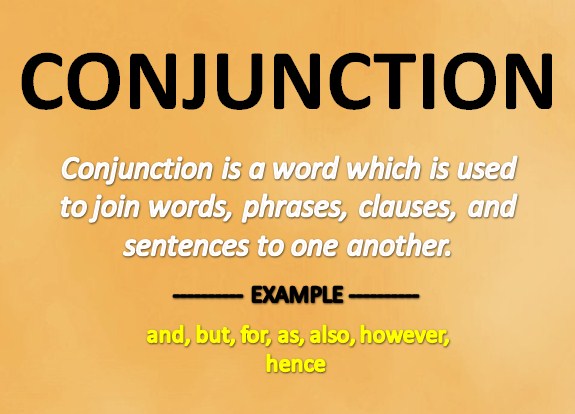A conjunction is a word that joins two words, phrases, clauses, or sentences.

Examples;
‘and, but, for, nor, or, so, yet, though, although, even though, while’
Adam and Sara are writing letters. [Joining two words]
Amira is waiting for you near the temple and under the tree. [Joining Two Phrases]
You cannot earn money unless you get a job. [Joining Two Clauses]
I have stopped my car but he did not do so. [ Joining Two Sentences]
In the above examples, you can see the conjunction ‘and’ joins two words (Adam, Sara), two phrases (near the temple, under the tree).
And the conjunction ‘unless’ joins two clauses ( ‘You cannot earn money’, ‘You get a job’).
And the conjunction ‘but’ joins two sentences ( ‘I have stopped my car’, ‘He did not do so’).
Kinds of Conjunctions
There are two kinds of conjunctions:
- Coordinating Conjunction
- Subordinating Conjuncion
Coordinating Conjunction
Here are some examples of Coordinating Conjunction;
“Whether….or, either….or, neither….nor, as well as, or, but, and, still, not only….but also”
There are four kinds of Coordinating Conjunctions:
- Alternative Conjunction
- Copulative Conjunction
- Adversative Conjunction
- Illative Conjunction
Alternative Conjunction
When there is a choice between the two statements, the conjunction which joins them is called Alternative Conjunction.
Example:
Either…or, Neither…nor, Whether …. or, or, etc
Whether he or she has stolen my money.
Either your brother or your sister will do the work.
Neither a pen nor a pencil is cheap.
Give some instructions or help him.
Copulative Conjunction
A Conjunction which addresses one statement or fact to the other one is called a Copulative Conjunction.
Example:
She was both a cheat and a traitor.
Sita as well as Ram has to go to the forest.
Trust in God and speak the truth.
Adversative Conjunction
When a Conjunction joins two opposite statements, it is called an Adversative Conjunction.
But still, yet, nevertheless, etc,
She could pass the exam, nevertheless, she worked hard.
I am studying hard but her brother is lazy.
Your brother is rich yet he is a miser.
Illative Conjunction
An Illative Conjunction joins two sentences to express inference.
therefore, consequently, for, etc.
He had done a crime therefore he was imprisoned.
She could not recognize his enemy consequently she lost everything.
My brother will get the target for he is studying day and night,
Subordinating Conjunction
A Conjunction that joins Subordinating Conjunction. a Principal and a Subordinate Clause is called a Subordinating Conjunction
He did not get success although he tried his best.
In the above example, the clause ‘He did not get success’ is Principal Clause.
And the clause ‘he tried his best’ is Subordinate Clause.
The conjunction ‘although’ is Subordinating Conjunction
She is very unhappy however she has lots of money.
In the above example,
Principal Clause – She is very unhappy
Subordinate Clause – she has lots of money
Subordinating Conjunction – however
There are the following Kinds of Subordinating Conjunctions:
Subordinating Conjunction
(Time)
“After/ Since/ Until/Till/ Before/While”
- He was playing until his parents came.
- while she was studying, she was remembering her teacher.
- My brother had completed his homework after the teacher came.
Subordinating Conjunction
(Place)
“Where/ Wherever”
- She knows well where he lives.
- I do not know where he wll continue the job.
- He will get success wherever he goes.
Subordinating Conjunction
(Reason)
“That, Since, Because, As”
- India won the match because they played well.
- She will continue to eat as she is hungry.
- Since you re uneducated, you cannot get a job.
Subordinating Conjunction
(Purpose)
“So that / Lest”
- He dived so that he could catch the ball.
- We should invite him lest he will feel insulted.
Subordinating Conjunction
(Concession)
“Though, Although, Even though”
- Although he is rich, he is not a miser.
- Though she has no money, she will go to the market.
- Even though he is honest, he is blamed tor cheating others.
- Although Miss Dolly is a teacher, she cannot speak English.
Subordinating Conjunction
(Result)
- He did not do the homework so he was punished
- You answered well so you were selected.
- I was late so I could not meet him.
Subordinating Conjunction
(Manner)
“As if / As”
- He plays cricket as if he were Sachin
- His brother talks as if he were a fool.
- You look as if you were a teacher.
Subordinating Conjunction
(Comparison)
“As/Than”
- My father is as intelligent as Mr. Lincoln.
- The eyes are more beautiful than any gift of God.
- His daughter is as white as snow.
very helpful to us ,very very thanks for google .